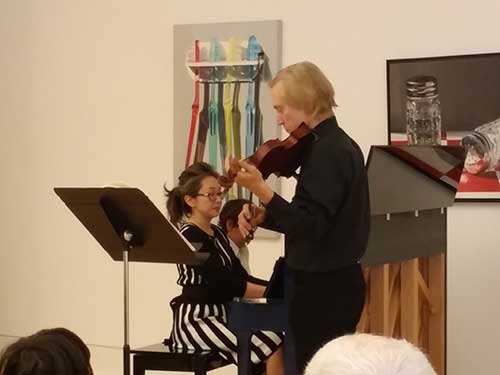
The single-composer concert is commonplace in popular music. But when it comes to classical music, it’s a different story. Googling “classical concert” returns about 450,000 hits. Google “one-composer concert” and you get 394 hits. “Single-composer concert” garners another 317. In other words, it’s notable simply for being uncommon.
Yet we live in an age of media “binging” – on TV shows, news, social media, movies, music, blogs, magazine and newspaper articles, authors – you name it. There’s even such a thing as binge researching, which is why it’s taken me two hours to write these two paragraphs.
The point is that in our age of single-focus fixation, concerts of music by a single composer shouldn’t be as unusual as they are.
Pianist Tamami Honma and violinist Julian Brown think that the single-composer concert is an ideal way to connect more people more deeply with live music. And one composer whose work lends itself to the single-composer concert is Ludwig von Beethoven (1770-1827) – the first super-star performer and the composer most responsible for the modern symphony orchestra, the modern piano, and the modern idea of artists answerable only to their muse.
Beethoven was a transformative and singular figure in western music. His music was the flowering of everything that came before, and made possible everything that came after.
Every Beethoven composition is, in a sense, many compositions, offering a kaleidoscope of musical experiences rich in melody, drama, passion and humor.
Many people seldom hear any but the most famous of Beethoven’s compositions – the “Moonlight” piano sonata, the Fifth and Ninth Symphonies, the “Spring” violin sonata. And that’s a shame, because as rich as those famous works are, every one of Beethoven’s piano sonatas, symphonies, and violin sonatas offer equal musical adventures.
To give everyone the opportunity to get acquainted with these works, Honma and Brown launched two free Beethoven performance series. Beethoven Odyssey I features Honma performing all 32 of Beethoven’s piano sonatas in 11 concerts. That series started in February at Cupertino’s Good Samaritan Methodist Church and will conclude on June 17.
Beethoven Odyssey II features Honma and Brown performing all 10 Beethoven violin and piano sonatas in five concerts, which began in April – the first of the Triton Museum of Art’s (www.tritonmuseum.org) free Sunday Gallery chamber concert series – and concludes on June 5. The 90-minute programs feature two violin sonatas and a piano sonata.
Pianist Tamami Honma (www.tamamihonma.com) is an internationally known performer and recording artist with degrees from the Manhattan School of Music and London’s Royal Academy of Music, where she wrote her thesis on Beethoven.
Honma is as passionate about community as she is about music. She’s a resident pianist for the local opera company, rehearsal pianist for the San Jose Symphonic Choir, and president of the Saratoga Education Foundation (SEF).
She is also responsible for the Triton Museum’s most recent acquisition, a Steinway upright piano – at less than half the typical price – making performances possible while the museum is raising the money to pay for it.
Concertmaster of the Silicon Valley Symphony and co-concertmaster of the California Pops Orchestra, Julian Brown (www.julianbrown.com) can only be described as a Renaissance man. He taught himself to play the violin at the age of eight, and started taking formal lessons at 12.
Brown studied physics at Cambridge and has worked as a radio producer, software engineer, and currently works for Stanford University. Brown has also written about science, including the book “Minds, Machines, and the Multiverse,” about quantum computing.
While the duo’s virtuosity is breathtaking and their interpretation is inspired, those things are in the background. First and foremost is electrifying music that simply enfolds every listener – from the very young to the very old, from aficionados to those hearing the music for the first time.
Combined with free admission and easy parking and accessibility, the friendly and intimate setting of the Triton Museum opens a connection between performer, listener and music that makes these concerts one-of-a-kind experiences.
Beethoven Odyssey II at Triton Sunday Gallery continues on Sunday afternoons at 3 p.m. May 29, and June 5 at the Triton Museum of Art, 1505 Warburton Ave.
Beethoven Odyssey I continues Saturday evenings at 7 p.m. on May 28, and June 4 and 17 at Good Samaritan Methodist Church, 19624 E Homestead Rd. at the corner of Linnet Lane (one block past Wolfe Rd.) in Cupertino. Give yourself extra time to find a parking place.






